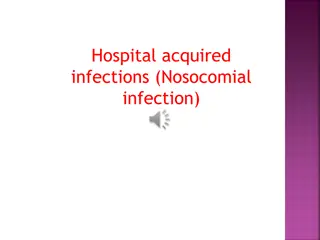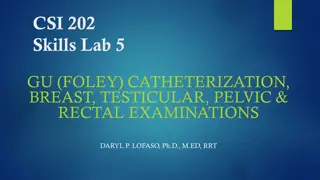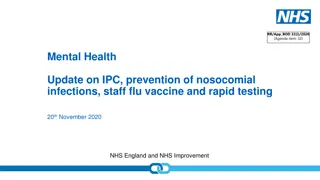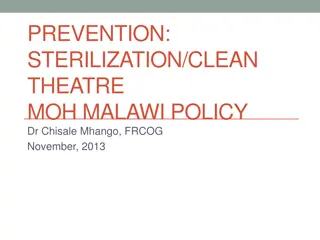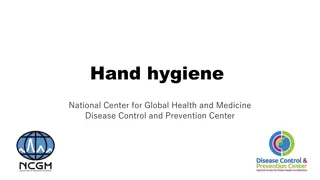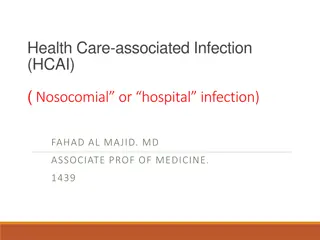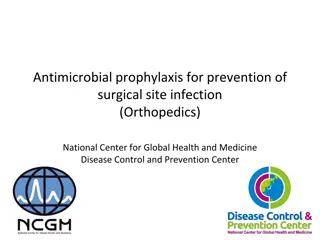The Evolving Landscape of Virtual Wards in Healthcare
The global COVID-19 pandemic has prompted a shift in healthcare delivery towards virtual wards, offering improved patient experiences, enhanced outcomes, and sustainable healthcare solutions. Virtual wards provide healthcare at home, reducing nosocomial infections and optimizing resource utilization
0 views • 26 slides
Nursing Care for Ventilator-Associated Pneumonia (VAP)
Ventilator-Associated Pneumonia (VAP) is defined as lung parenchyma inflammation occurring 48 hours or more after endotracheal intubation and mechanical ventilation initiation. It is a common nosocomial infection in ICU patients, with significant morbidity and mortality rates. Etiology of VAP involv
2 views • 24 slides
Understanding Nosocomial Infections and Prevention Strategies
Nosocomial infections are microbial diseases that affect patients during hospital stays, with sources including patients, healthcare workers, and hospital environments. Investigations involve isolating organisms and typing them for efficient management. Prevention strategies include sterilization, h
10 views • 8 slides
Clinical Skills Lab: Foley Catheterization, Breast & Pelvic Examinations
This informative content covers topics such as urethral catheterization, indications for catheterization, anatomic landmarks, male and female catheterization techniques, nosocomial UTIs, pelvic and breast examinations, breast cancer screening recommendations, and breast cancer statistics. It is a co
1 views • 17 slides
Understanding Proteus Bacteria: Historical Significance, Pathogenesis, and Laboratory Diagnosis
Proteus species, named after the Greek god Proteus, exhibit pleomorphism. Their historical importance stems from the unique characteristics of H and O antigens, with flagellated strains resembling a thin film on agar. Pathogenically, Proteus mirabilis and P. vulgaris are opportunistic pathogens caus
0 views • 12 slides
Update on Mental Health, Infection Prevention, Staff Vaccine, and Testing in NHS England and NHS Improvement
In the agenda for the meeting on 20th November 2020, topics included updates on mental health, staff flu vaccine and testing, infection prevention, and nosocomial infections in NHS England and NHS Improvement. The importance of preventing COVID-19 nosocomial infections was emphasized, along with fac
0 views • 10 slides
Operating Theatre Infection Control Guidelines and Practices
Infection control in operating theatres is crucial to prevent nosocomial infections. The layout, practices, and guidelines outlined by Dr. Chisale Mhango in Malawi emphasize sterilization, cleanliness, and strict protocols for patient safety and staff well-being. Key elements include proper storage
0 views • 34 slides
Importance of Hand Hygiene in Healthcare Settings
Hand hygiene plays a crucial role in preventing nosocomial infections, reducing MRSA incidence, and cutting costs in healthcare facilities. Studies have shown a significant decrease in infection prevalence and MRSA cases, as well as substantial cost reductions with proper hand hygiene practices. Mon
0 views • 10 slides
Understanding Health Care-associated Infections (HCAI) in Hospital Settings
Health care-associated infections (HCAI), also known as nosocomial or hospital infections, are infections that occur in patients during their hospital stay or after discharge. These infections can result from various sources, including colonization by microorganisms and exposure to contaminated envi
0 views • 48 slides
Antimicrobial Prophylaxis for Surgical Site Infection Prevention in Orthopedics
Surgical site infections (SSIs) are common and costly healthcare-associated infections, accounting for a significant percentage of nosocomial infections. Defined by the CDC, SSIs occur within 30 days of surgery and have clinical criteria such as purulent exudate, positive cultures, or surgeon diagno
0 views • 10 slides


